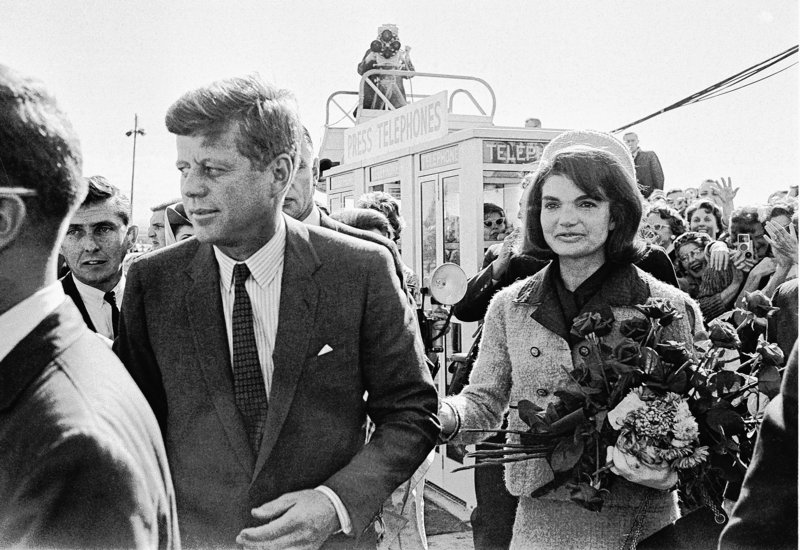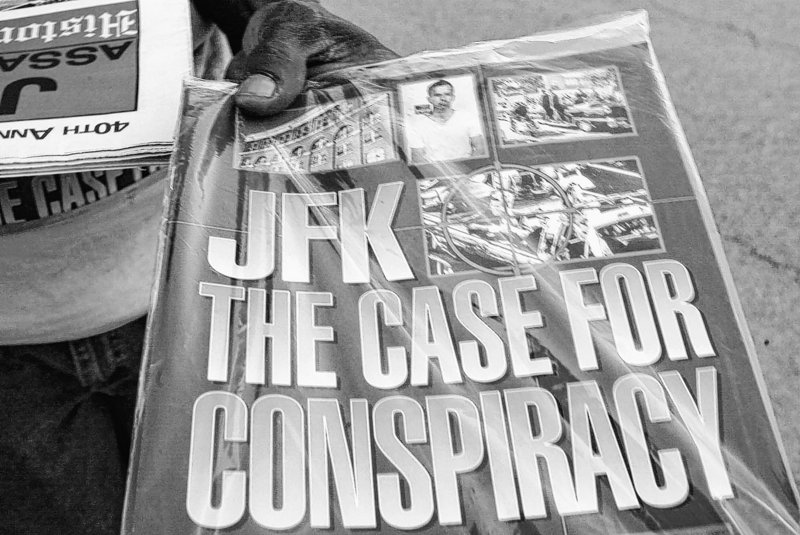On the day John F. Kennedy died, a cottage industry was born. Fifty years and hundreds of millions of dollars later, it’s still thriving.
Its product? The “truth” about the president’s assassination.
“By the evening of November 22, 1963, I found myself being drawn into the case,” Los Angeles businessman Ray Marcus wrote in “Addendum B,” one of several self-published monographs he produced on the assassination. For him, authorities were just too quick and too pat with their conclusion.
“The government was saying there was only one assassin; that there was no conspiracy. It was obvious that even if this subsequently turned out to be true, it could not have been known to be true at that time.”
Most skeptics, including Marcus, didn’t get rich by publishing their doubts and theories — and some have even bankrupted themselves chasing theirs. But for a select few, there’s been good money in keeping the controversy alive.
Best-selling books and blockbuster movies have raked in massive profits since 1963. And now, with the 50th anniversary of that horrible day in Dallas looming, a new generation is ready to cash in.
The Warren Commission officially concluded in 1964 that Lee Harvey Oswald had acted alone — and issued 26 volumes of documents to support that determination. But rather than closing the book on JFK’s death, the report merely served as fuel for an already kindled fire of doubt and suspicion.
Since then, even government investigators have stepped away from the lone assassin theory. In 1978, the U.S. House Select Committee on Assassinations ended its own lengthy inquiry by finding that JFK “was probably assassinated as a result of a conspiracy.”
That panel acknowledged it was “unable to identify the other gunman or the extent of the conspiracy.” But armed with mountains of subsequently released documents, there has been no shortage of people willing to offer their own conclusions.
Among the leading suspects: Cuban exiles angry about the Bay of Pigs fiasco; Mafiosi enraged by Attorney General Robert Kennedy’s attacks on organized crime; the “military-industrial complex,” worried about JFK’s review of war policy in Vietnam.
One theorist even floated the notion that Kennedy’s limousine driver shot the president — as part of an effort to cover up proof of an alien invasion.
Anything but that Oswald, a hapless former Marine, was in the right place at the right time, with motive and opportunity to pull off one of the most audacious crimes in American history.
“As they say, nature abhors a vacuum, and the mind abhors chance,” says Michael Shermer, executive director of the Skeptics Society and author of “The Believing Brain,” a book on how humans seem hardwired to find patterns in disparate facts and unconnected, often innocent coincidences.
Polls underscore the point.
About 6 in 10 Americans say they believe multiple people were involved in a conspiracy to assassinate Kennedy, while only one-fourth think Oswald acted alone, according to an AP-GfK survey done in mid-April. Belief in a conspiracy, though strong, has declined since a 2003 Gallup poll found 75 percent said they thought Oswald was part of a wider plot.
The case has riveted the public from the start. When the Warren Commission report was released in book form, it debuted at No. 7 on The New York Times Best Sellers List.
Two years later, lawyer Mark Lane’s “Rush to Judgment” dominated the list. The Warren Commission, he argued, “frequently chose to rely on evidence that was no stronger and sometimes demonstrably weaker than contrary evidence which it rejected.”
The book has since sold millions of copies in hardcover and paperback, Lane says.
Since then, dozens of books with titles like “Best Evidence,” “Reasonable Doubt,” “High Treason” and “Coup D’Etat in America: The CIA and the Assassination of John F. Kennedy” have sought to lay responsibility for JFK’s death at the highest levels of the U.S. government — and beyond.
British journalist Anthony Summers, whose BBC documentary became the 1980 book “Conspiracy,” says many conspiracy buffs “are fine scholars and students, and some are mad as hatters who think it was done by men from Mars using catapults.”
Unlike the later coverage of Watergate, there were no reporters like The Washington Post’s Bob Woodward and Carl Bernstein, who were told by their editors, “Get on this and don’t get off it,” says Summers, whose works focused on people and events largely ignored or treated cursorily by the official investigations. “Nobody went down there and really did the shoe leather work and the phone calls that we’re all supposed to do,” he says.
For many, the Kennedy assassination has become “a board game: ‘Who killed JFK?’ So you feel free to sit around and say, ‘Oh! It’s the mob. Oh! It’s the KGB’ … and have no shame,” scoffs Gerald Posner, whose 1993 book “Case Closed” declared that the Warren Commission essentially got it right.
The Oswald-as-patsy community has vilified Posner.
Unlike Posner, Vincent Bugliosi, author of 2007’s “Reclaiming History: The Assassination of President John F. Kennedy,” embarked on his book expecting to vindicate the Warren Commission.
What he didn’t expect was for it to balloon into a 1,650-page behemoth — with a CD-ROM containing an additional 960 pages of endnotes — that cost $57.
“STOP writing,” he recalls his wife telling him. “You’re killing the sales of the book.”
The 78-year-old lawyer blames the conspiracy theorists. “We’re talking about people,” he explains, “who’ve invested the last 15, 20, 25 years of their life in this. They’ve lost jobs. They’ve gotten divorces. Nothing stops them.”
“Like a pea brain,” he says, he responded to all of their allegations. “It’s a bottomless pit. It never, ever ends. And if my publisher … didn’t finally step in and say, ‘Vince, we’re going to print,’ I’d still be writing the book.”
Despite its girth and hefty cost, “Reclaiming History” had a respectable first printing of 40,000, says Bugliosi, best known as the former deputy Los Angeles district attorney who prosecuted Charles Manson.
Many other conspiracy authors have similarly immersed themselves, often coming to the same conflicting conclusions, but the books continue to sell.
Hollywood has also found the conspiracy to be fertile ground:
• Leonardo DiCaprio and Robert De Niro are to star in a feature film version of the book “Legacy of Secrecy” — with a reported cost of up to $90 million.
• Meanwhile, Marcia Gay Harden and Billy Bob Thornton have signed on for the Tom Hanks-produced “Parkland,” named for the Dallas hospital where Kennedy was pronounced dead.
• And a TV movie is to be made from another new book, “Killing Kennedy,” co-written by Fox News host Bill O’Reilly, which had sold 1 million copies within four months of its release in October.
While even some conspiracy authors admit to having doubts about the value of the endless stream of material, there is little doubt among most that after the anniversary arrives, it won’t bring the last word on the subject.
Send questions/comments to the editors.




Success. Please wait for the page to reload. If the page does not reload within 5 seconds, please refresh the page.
Enter your email and password to access comments.
Hi, to comment on stories you must . This profile is in addition to your subscription and website login.
Already have a commenting profile? .
Invalid username/password.
Please check your email to confirm and complete your registration.
Only subscribers are eligible to post comments. Please subscribe or login first for digital access. Here’s why.
Use the form below to reset your password. When you've submitted your account email, we will send an email with a reset code.